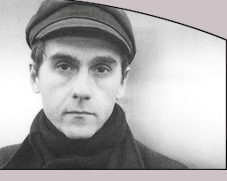 |
"The world is littered with a wealth of submerged stories (and
histories) that can be drawn to the surface and magnified. Oncehidden
details, captured in a documentary mode, can serve as
narrative triggers, and the richness of their un-simulated veracity can
be a great resource for the fiction filmmaker. For me, the essence of
documentary is an openness to the existing world as it unfolds before
the camera. By exploring the cross-fertilization of documentary and
narrative, traditional rules are called into question and the standard
movie-going experience is destabilized, transformed, and in small but
crucial ways, reborn."
Jem Cohen's films have been called “heart-breaking and trance-inducing,” with a “fierce
political intelligence.” An admirer of Walter Benjamin and Robert Frank, he draws inspiration
from the street, often shooting solo in places from Brooklyn to Budapest. Cohen works in 16
mm, Super 8 and video, building an archive of images over periods of up to ten years.
Challenging himself to film what he had previously “framed out,” and organically fashioning
hybrids, (experimental documentaries and lyrical portraits—a pre-sanitized Times Square, a
musician living with AIDS), more recently he has begun to lace scripted, living, breathing
fiction into the mix. A believer in film, art and music, he often works with musicians,
especially those who embody independence (Fugazi, Terry Riley, Godspeed You Black
Emperor!, Patti Smith). Cohen sees film as a “revelation machine,” investigates what he terms
“the camera's unsparing ability and cooler eye,” and mines the forces, wonders, damages and
poetry of everyday life.
|

| 



  
|








